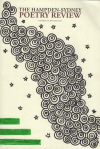The Hampden-Sydney Poetry Review – Winter 2013
“Unpredictability” is the word editor Nathaniel Perry chooses to describe what unifies the many poems in this year’s issue of The Hampden-Sydney Poetry Review. And whether you’re reading quatrains about pay phones, a narrative about catching dinner in a water hazard, or an inscrutable ode to the beauty of inscrutability, the narrators encountered in the new issue are an undeniably unpredictable bunch. Boasting over one hundred pages of poetry, poetry reviews, and conversations about poetics, the staff of the review have done their level best to tide readers over until next year’s issue arrives in the mail. The issue’s unpredictability even extends to its individually illustrated covers, a refreshingly communal touch from such an established magazine. Nearly forty years on, the review is still finding new ways to spice things up under its covers as well.
“Unpredictability” is the word editor Nathaniel Perry chooses to describe what unifies the many poems in this year’s issue of The Hampden-Sydney Poetry Review. And whether you’re reading quatrains about pay phones, a narrative about catching dinner in a water hazard, or an inscrutable ode to the beauty of inscrutability, the narrators encountered in the new issue are an undeniably unpredictable bunch. Boasting over one hundred pages of poetry, poetry reviews, and conversations about poetics, the staff of the review have done their level best to tide readers over until next year’s issue arrives in the mail. The issue’s unpredictability even extends to its individually illustrated covers, a refreshingly communal touch from such an established magazine. Nearly forty years on, the review is still finding new ways to spice things up under its covers as well.
An undeniable highlight of the new issue is Robert Wrigley’s “Tinnitus,” a poem that takes on the subject of nostalgia through one man’s interaction with a disappearing species: pay phones. In pitch-perfect formal verse, Wrigley’s narrator sets a bank of pay phones ringing, using pay phone to call neighboring pay phone, their rings giving voice to the unspeakable joys of nostalgia. Wrigley writes about the creation of this righteous noise:
and from the third, call the next one left,
and from the fifth, call the sixth and final phone,
creating, as I do, a carillon
of overlapping, almost identical rings,
disturbing the many students studying
in this building, where there is no one home.
The musicality on display in Wrigley’s poem seems to be a hallmark of much of the poetry in this issue. One need only read the following excerpt from Don Johnson’s terrific poem “Hazard” to become further acquainted with the easy pleasures of a well-turned rhyme:
We filled the tow sack with thirty squirming
croakers, cruising the pond like otters,
scheming to return the next night to salvage
the Titleists, Top Flights and Slazengers
Johnson deftly handles the subjects of childhood and social class, crafting a resonant narrative with a light touch. Reading this evocative poem about a summer night while trapped in the depths of the meat locker that is the Midwest in winter, I couldn’t help but feel grateful to the poet.
Since we are talking about the sound a poem makes, we should include Terrance Hayes, whose poem “She Walks Right In, She Walks Right Out” is another of the issue’s standouts. Hayes’s sinuous lines and leaps in logic nicely capture the inscrutability of time and memory. About aging’s attendant uncertainties, Hayes writes that they can make one feel like “Something at the ‘of’ of its life / caught in a blind spot, something terribly immense. Anyone / can walk on water if the water is ice.” Hovering just beyond the edge of total comprehensibility, this poem dares you to walk its waters. It’s a compelling craw-sticker that demands to be read, then reread.
Whether their unpredictability stems from the strangeness of the action being described, the surprising arrival of an end rhyme, or their purposefully inscrutability, the poems in this issue feel unpredictable because a group of very skilled poets have written poems whose narrators feel authentic enough to believe.
[www.hsc.edu/poetry-review.html]





